Peter MALONE
Saturday, 18 September 2021 18:47
Meet the Parents

MEET THE PARENTS
US, 2000, 108 minutes, Colour.
Robert de Niro, Ben Stiller, Teri Polo, Blythe Danner, Nicole de Huff, Jon Abrahams, Owen Wilson, James Rebhorn, Thomas Mc Carthy.
Directed by Jay Roach.
This comedy recently spent four weeks at the top of the US Box Office chart. Audiences always welcome a comedy. And this one is for adults rather than one of those many geared for teens. Anyone who remembers their first encounter with their in-laws or those who may be anticipating such a meeting, this is the comedy for you. The encounter is a nightmare!
Because that is the simple plot of Meet the Parents. Male Nurse Greg wants to propose to his teacher girlfriend Pam but hears just in time that he first needs her father's permission. Her sister is getting married to an approved highly qualified doctor, so Greg and Pam go on what ought to be an enjoyable two days, but Greg has underestimated her father. Everything (and you will be surprised just how much everything can actually entail) goes wrong - and then some!!
For those who have been following Robert de Niro's career, he is noted for serious roles in serious dramas, comedy not his forte. But in the last two years, he has been appearing in comedies: as the mobster having a nervous breakdown and seeking secret therapy in Analyse This; a cartoonish caricature as Fearless Leader in The Adventures of Rocky and Bullwinkle, as the homophobic cop with a stroke who takes vocal lessons from a drag queen in Flawless and, now, as an ogre father-in-law.
De Niro's comic timing helps the continuous smiles (rather than raucous laughter) during the film. He knows how to menace and he relies on this to intimidate his rather gentle 'nice guy' prospective son-in-law while also dropping clangers and drawing on his CIA experience in getting the truth out of spies.
Ben Stiller is very good undergoing interrogations, humiliations and all kinds of discomfort and accidents during his weekend stay. In 1998's There's Something About Mary, he was made to undergo all kinds of physical mishaps, so audiences know how well he can play the long-suffering victim. (He was also the young Rabbi in the recent Keeping the Faith.) We are invited to identify with him and so we too become the butt of De Niro's barbs. This is why the combination of sharp dialogue, constant misunderstandings, farcical situations and some slapstick comedy works so well. And for those who have had trouble when flying, there are also a lot of jokes at the expense of airlines!
Blythe Danner, who has been in films for decades but who has come into some prominence recently because she is Gwyneth Paltrow's mother, is De Niro's genial wife. Teri Polo is a vigorous fiancee and Owen Wilson has some good smarmy moments as her former fiancee who is a whizz at stocks, a whizz at elaborate carpentry and a born again Christian.
It is interesting to note that this film and What Lies Beneath (reviewed some months ago) have been box-office bonanzas, a reminder to movie makers that older audiences appreciate solid dramas and comedies - and hope for more.
1. The popularity of the film? Top comedy of 2000? Marriage jokes, in-law jokes, meet the parents jokes?
2. The background of city life, the details of work in the hospital, Greg as a male nurse? The contrast with the in-laws’ house? The various rooms, Jack Byrnes’ various devices? The musical score?
3. Audience expectations: comedy, the cast?
4. The audience on-side with Greg, his being with the patients, the reaction of the patients, especially to his not being a doctor? His being a nurse? The status of male nurses – and people considering them less? His relationship with Pam, the proposal, the preparation? The phone call? The background of Deborah and Doctor Banks and their getting her father’s permission? The phone call and the expectations for Greg to get permission? His change of heart? His decision to meet the parents? The characters, the comic and the straight man, serious? Greg as accident-prone – and the various situations to capitalise on this? The contrast with Pam, being ordinary, at work, nice?
5. At the airport, the losing of the packages, the luggage, the flight? Greg and his arguments, security, accident-prone?
6. Meeting the parents, Jack and Dinah? Jack and his type, severe? Dinah and her being friendly? The gift of the flowers – and Jack’s reaction, not interested? The puzzle, especially because of his occupation with rare flowers?
7. Robert de Niro as Jack Byrnes, screen presence, seriousness, a character without humour? The flowers, his accepting them? His serious attitude towards his daughters? His devotion to his daughters, spoiling Pam? Deborah and the preparations for the marriage? The visit of the Banks’ in-laws? The meals, awkwardness for Greg? The preparation for the marriage? Jack and his checking on Greg, the jokes about surveillance, the machinery for surveillance and the technology? The Ouzo and the accident? Jack and his attitude towards sex, his indication that he was keeping his eyes on Greg? His going to the supermarket, Greg seeing the deal? Greg’s interpretation?
8. The family in the house, the tension of the meals, the room, Greg and his moving around the house, his snooping, Jack and his surveillance? His taking him in, the experience of the lie detector? Greg’s test?
9. The episode with the cat, the well-trained cat, going to the toilet, the disappearance of the cat, trying to get a substitute cat? His lies?
10. Kevin, his ominous presence, the past relationship with Pam? His house, his success, his being present at the wedding?
11. Greg, the accidents, the havoc and the destruction, the electric lights, the fire, the sewage, the cat? His swimming and the accident to his eye?
12. The episode with the cat, the new cat, the disguise, the neighbours and their concern, the reappearance of the old cat? His being unmasked?
13. The wedding, the celebration, Kevin being the minister?
14. Dinah and her kindness, friendliness towards Jack, concern for Pam? Persuading Jack to be more agreeable? Greg and the camera? The final humorous taunts to Jack at the end?
15. How well delineated the characters, ordinary parents, serious, the touch of the caricature, real issues? Deborah and her fiancé and his family? The other neighbourhoods?
16. The visual humour, the verbal humour, the combination of farce with heightened reality? Open for a sequel?
Published in Movie Reviews
Published in
Movie Reviews
Tagged under
Saturday, 18 September 2021 18:47
Actresses
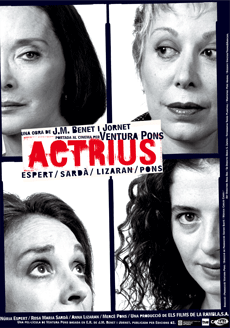
ACTRESSES
Spain, 1997, 100 minutes, Colour.
Nuria Espert, Rosa Maria Sarda, Anna Lizaran, Merce Pons.
Directed by Ventura Pons.
Actresses is one of a number of films by Catalan director Ventura Pons. Award-winning in Spain and in his native Catalonia, he went on to make a number of films including Anita Takes a Chance and Food For Love.
This is a film about theatre, a young student preparing herself for her stage debut, interviews three actresses. The film offers insights into performance, insights into production, insights into the personalities of the actresses.
The film and the actresses won several Catalan prizes in 1997.
1. The impact of this drama? Catalan? Universal?
2. The prologue: the actresses, the parents, the theatre and the play? The figurines?
3. The world of the theatre, the physical reality of theatre and performance, dialogue and talk, drama – and the theatre of life? As transferred to the screen?
4. The classics and performance, the discussions, complications? Celebrities, television? Dubbing?
5. Stars, reputations? Family, relationships, the theatre? Favourites, the finale? Anna – death, competition, the results?
6. The young student, accosting each of the actresses, her manner, her hopes, her capacity for listening, puzzles, identifying issues, the theatre itself – the gift, burning, her not being part of it?
7. Gloria as an actress, personality, her career? Her haughtiness? Her reading, Anna and the interactions, melodrama? As a portrait – character and views?
8. Assumpta, the television station, her character, her manner, haughty, the theatre, the discussions, sexual relationships? Iphigeneia?
9. Maria, more pleasant, ill, more balanced in her career, performances? Deaths and the accident? Stealing the theatre? The phone call? Death?
10. The meal, the three and the plans?
11. The discussions between Gloria and Rocca? Rivalry, comparisons, the theatre, the future?
12. The issue of fire, burning, consuming? An apocalyptic touch for a drama of life?
Published in Movie Reviews
Published in
Movie Reviews
Tagged under
Saturday, 18 September 2021 18:47
Cardboard Cavalier

CARDBOARD CAVALIER
UK, 1949, 96 minutes, Black and white.
Sid Field, Margaret Lockwood, Mary Clare, Gerry Desmond, Claude Hulbert, Irene Handl, Miles Malleson, Peter Bull.
Directed by Walter Forde.
Cardboard Cavalier was a star vehicle for comedian Sid Field. He was a vaudeville and stage star who had appeared in the musical extravaganza, London Town in 1946. It was not a box office success. However, Field died the year after the release of Cardboard Cavalier.
Margaret Lockwood, a favourite of British films during the late 1930s (The Stars Looked Down, The Lady Vanishes) and of the war period (especially The Wicked Lady) appears as Nell Gwyn.
The period is that of Cromwell and the Restoration, Sid Field portraying Sidcup Buttermeadow as an awkward young type who overthrows Cromwell and ushers in the Restoration.
A number of character actors appear in this rather madcap British comedy. A commentator noted that there are similarities in spirit to Rob Reiner’s 1987 The Princess Bride.
1. The British film industry after World War Two? Dramas? Comedies?
2. The black and white photography, the parliamentary and Restoration settings? London town? Squalor? The countryside? Affluence? The musical score?
3. The personality of Sid Field, his stage and vaudeville background? His ability to carry a film? Comic and bumbling style?
4. The farcical tone, the serious period? The blend of jokes and reflection on the period?
5. Audience knowledge of Oliver Cromwell, attitude towards Cromwell, the execution of Charles I, the parliament, the civil war? His governorship? Military efforts, especially in Ireland? The contrast with Charles II, in exile after the death of his father, the royalists and their support in France? Exiled during the period of the Commonwealth, his return, the Restoration? His reputation, style? His women – and Nell Gwyn?
6. The atmosphere of the Commonwealth? The puritan atmosphere? Prison, cruelty? The world of spies, soldiers? Cromwell himself?
7. Charles II and the way that he was portrayed, in exile, the monarchists and the spies? The letters and arrests?
8. Sidcup Buttermeadow as the cardboard cavalier and the irony of the name? Sid and the nuts, the soldiers, in the stocks? The encounter with Nell, nice? With Lovelace? Tom and Nell? His mission, the rehearsal? The Tower and Nell Gwyn? The dancing master? Sid as Matilda? The ghost, the heroics, the end with Sir Sid?
9. Margaret Lockwood as Nell Gwyn, singing, pleasant, her encounters with Sid, the relationship with Tom? Ideas? The court? The Tower? Dancing and the end?
10. Lovelace, espionage, his arrest? The contrast with Tom and the relationship with Nell?
11. The women, Milady Doverhouse and her contribution? Lady Agnes? Maggie? The contrast with the comic styles of the men: Sylvester Clutterbuck, Judge Gorebucket, Uriah Groop, Murder Casket, Brother Barebones, Mosspot?
12. The ghost? The comedy – with the slightly supernatural touch? The blending of history and farce?
Published in Movie Reviews
Published in
Movie Reviews
Tagged under
Saturday, 18 September 2021 18:47
Urban Cowboy
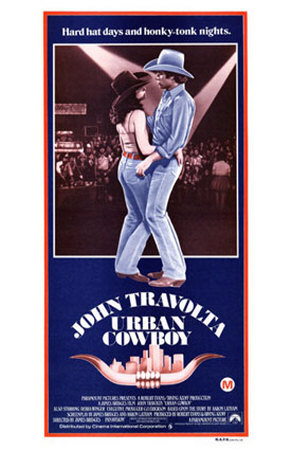
URBAN COWBOY
US, 1980, 135 minutes, Colour.
John Travolta, Debra Winger, Scott Glenn, Madolyn Smith, Barry Corbin, Brooke Alderson.
Directed by James Bridges.
Writer-director James Bridges makes interesting thematic films of American life (The Babymaker, Paper Chase, China Syndrome). This enjoyable, rather overlong, story of a country boy coming to the city, working in industry and finding his outlet and echo of the Texas cowboy traditions in riding (ultimately for championship prize money) a nightclub mechanical bull is in this vein. John Travolta does quite well in the role, sometimes bursting into dance as the film as a considerable country and western soundtrack. The setting is Houston, the atmosphere heavily Texan, but the problems, especially the immature marriage and brash break-up (and leading lady Debra Winger is excellent) are universal.
1. An enjoyable, satisfying film? Success as a John Travolta vehicle - his particular style? A piece of Americana of the '70s? Of Texas and its people?
2. Panavision colour photography, the capturing of the atmosphere of Houston -industry, homes, Gilleys? The special effects - especially in Gilleys? The flavour of Texas and its cities?
3. The use of music? The Urban Cowboy them - Looking In The Wrong Place? The medley of songs used and the particular points of insertion for illustrating the theme e.g. Stand By Me? Western style? The soundtrack and the snippets of songs? The performances in Gilleys? The social comment made by the lyrics?
4. The significance of the title: the American heritage of the west, the tough macho man (and attitude towards women)? The role of the cowboy in the west - as illustrated by the rodeo? Riding the bull? The passing of the west - and its heroes? The ordinary cowboy now in the city? The alternate work that he has to do: industry? Any less demanding and tough? The status of the man who used to be the cowboy - demoted and ordinary? How can the urban cowboy be a hero? Gilleys and its atmosphere? The mechanical bull to prove manhood, macho strength, the cowboy tradition? Artificial means - and for recreation at night? The contemporary cowboy as less than the original? (Or the danger of glamourising the original?)
5. John Travolta as Bud - the initial focus on him, appearance and manner? Moving from the country? The road and the vistas of the city? The hospitality of his uncle and aunt? Settling in with them, prospects of work, marriage, money? His lack of foresight about the future - but his hopes? The ironies of what happened to him, the fulfilment of hopes?
6. The interviews for work, the money, shaving, on the job? The continued vistas of industry in Houston? His injury and his being laid off? His extra shift work for more money? The danger of the fire and the death of Uncle Bob? Did the film adequately capture the ethos of hard work in the cities?
7. The monotony of the work and the relief at Gilleys? Gilleys as a star of the film: the large space, the variety of entertainment, the spirit, dancing, drinking, the women? Bud first seeing it (and the audience seeing it with him)? His continually going there? First seeing Sissy at Gilleys? Her dress, hopes? Noticing him? The mechanical bull as a focus for activity in Gilleys? Competitiveness and achievement? Bud and his uncle and aunt, enjoyment, the friends fixing him up with the girls, his night with the girls? The transition to his attachment to Sissy?
8. Sissy - a Gilley's type, her clothes, talk, dancing? The building up of her image of the cowboy? The encounter with Bud and their getting to know one another during the dancing? The transition to the marriage - and the device of the photo collage? The reception? Being blindfolded and her new how? Her slovenliness in housekeeping? The enjoyment of going to the rodeo - and the first glimpse of Wes? The brief preparation for the marriage? Its inadequacy? Its being doomed to failure?
9. The basis of Bud's and Sissy's marriage? The first week - Bud and his work, Sissy's slovenliness at home, the clash over the meal? Bud's masculine expectations of the woman's role? Sissy's reaction? The comparisons with the riding of the bull and Sissy's threatening Bud? His violent reaction? The shallowness of the love, the brittleness of the breaking?
10. Bud and his liaison with Pam? Pam's background, her presence at Gilleys? Her inviting Bud into the affair? Her attraction? His speaking plainly about his relationship with her to make Sissy jealous? Their outings. Pam's keeping house for Bud? Sissy and the cleaning up of the trailer and Pam's destroying the note? The build-up to Bud's participating in the competition, his treating her in the same way as he treated Sissy., wanting her to wake him up etc.? Her presence at the competition, her watching Bud.. watching Sissy? Her change of heart and telling him the truth? Her offering herself for the future in similar circumstances? The effect on Bud of this liaison?
11. Wes as the rodeo type - in the rodeo itself, information about his being on parole, his presence at Gilleys and his being hired to help, his vindictiveness towards Bud? Lessons for Sissy? The building up of the rivalry? Sissy's attraction towards him on the rebound? The liaison, his brutal treatment of her? His parallelling Bud in his callous treatment of women and his expectations? His participation in the competition, the robbing of Gilleys, the fight?
12. Bob and Corene - their place in Houston, recreation at Gilleys, their covering for Bud? Their love for him and support? Bob and his work, his advice for Bud, training him for the competition, the pathos of his death immediately after giving Bud wise advice? The grief at his funeral - Pam’s suave presence and Sissy's awkward presence but compassion? Corene and her love for Bud, grief for Bob? Giving Bud the buckle and urging him to go into the competition?
13. The build-up to the competition - the dancing, the singing, the bull-riding? The suspense of the competition, the accumulation of points? Sissy and Pam and their watching? Sissy's disappearance? Bud's discovery of her injuries., the fight with Wes and the recovery of the money?
14. The basic themes of the film - ambition, love, knowing one another before marriage, clashes, fights and reconciliation? The happy ending for Bud and Sissy - the pattern of Bob and Corene?
15. How well did the film create the atmosphere of the modern city. hard work, the boring work and life and recreation, home life, marriage, mistakes? The symbolism of the urban cowboy and his winning on the mechanical bull?
Published in Movie Reviews
Published in
Movie Reviews
Tagged under
Saturday, 18 September 2021 18:47
Uptown Girls

UPTOWN GIRLS
US, 2003, 92 minutes, Colour.
Brittany Murphy, Dakota Fanning, Marley Shelton, Donald Faison, Jesse Spencer, Austin Pendleton, Heather Locklear.
Directed by Boaz Yakin.
This is not a film for adults to be reviewing. Most might find it hard and irritating going.
Brittany Murphy (Clueless, 8 Mile, Don't Say a Word) is an irritating young woman, unlucky in love and just about
everything else despite have a famous rock and roll father who wrote a song for which everybody knows. She can be ditzy most of the time because money is not what she lacks. Responsibility has never been part of her vocabulary or her life. She can't resist spending despite the caution of her endlessly patient friend. Abandoned by the English musician she thought was the one, bankrupt and impossible to live with, she accepts a job as a nanny for the daughter of a club owner (Heather Locklear).
Dakota Fanning (I am Sam, The Cat in the Hat) is an irritating young girl. Left to her own devices by her absent mother, she is rigid in routines, demanding and intolerant.
If you need to see a film where two people change as you know they are going to, from impossible to nice, then this is your film. Despite the talents of the two actresses, this seems a long story.
1. The audience for this film? Teenage, children, adults? Identifying with particular characters, issues?
2. The title, the reference to the city, New York as the city? The variety of locations, for Molly, for Ray? The buildings, the apartments, the locations? The musical score and songs, especially for Neal and his singing?
3. The tone of the film, comedy, serious? The slapstick, the parody, the satiric and ironic tone? The realism, the portrait of the adult and the girl, their interactions, their family backgrounds, the film's comment on family, on the need for relationships and love?
4. Molly, her wealthy father, his singing, his writing songs about her? The shrine to him? His absence? The effect on Molly, being spoilt? Her friendship with Ingrid? Boyfriends? Having no idea of money? People coming in and out of her apartment? The sudden discovery that her manager had stolen her money?
5. Her denial, going to the shops and trying to buy things, her friends trying to help her face reality? Her relationship with Neal, the meeting, friendship, shared interests, music, the sexual relationship? His moving on? Her being stranded?
6. Answering the advertisement, the interview with Mrs Schleine? The criticisms of Mr McConkey? and his ousting her? Her taking the job, her inadequacy? The initial relationship with Ray? The contrast between the two? Her trying to manage, making a mess of things, Ray reprimanding and correcting her? Going to the club, seeing her mother, her mother's neglect of Ray? Their having to be together? Each trying to outwit the other? The gradual breaking down of the barriers, Ray mellowing, Molly having to take some responsibility? Molly's paralleling Ray's life with her own? Their going out, beginning to share things together, talk? The breaking down of the barriers, Molly being fired, Ray's reaction, Molly and the bond between the two? A future?
7. Ray, her age, her being controlling, concerned about health? Alone in the house, the wealth, her unhappiness, her mechanisms for surviving? Her relationship with her mother, her mother's absence? Cantankerous, making life difficult for nannies? The initial antagonism to Molly, trying to thwart her? Molly and her sense of failure, coming back, the gradual breakdown, Ray discovering that she could not control everything, her need for affection, her need for love? Shared experiences with Molly, the change? Her ballet, wanting her mother to see her performance, Molly as the surrogate mother, her skills and talent despite antagonising people during rehearsals? Her change?
8. Neal, his music, meeting with Molly, in awe of her father, the relationship, staying in the apartment? His eventually leaving, his return, his being transformed by his success?
9. Ingrid, Molly's best friend, trying to help her, exasperated at Molly's behaviour, trying to make her face the truth? Her continued support? The other friends, their crashing in the apartment, their disappearing when Molly fell on hard times?
10. The predictability of the film, the two antagonistic characters, their abrasiveness, irritating each other - and the audience? Audiences knowing that each would break down and would come to depend on the other and learn how to love?
Published in Movie Reviews
Published in
Movie Reviews
Tagged under
Saturday, 18 September 2021 18:47
Umberto D
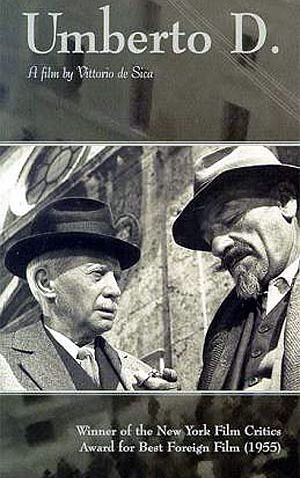
UMBERTO D
Italy, 1951, 88 minutes, Black and white.
Carlo Battisti, Maria Pia Casilio, Lina Gennari.
Directed by Vittorio de Sica.
Umberto D is a fine example of Italian neo-realistic cinema. Vittorio de Sica had already made the famous examples of this genre - Shoeshine (1946); Bicycle Thieves (1947); Miracle in Milan (1951). This study of ageing and loneliness he dedicated to his father. The film was a commercial failure, although critically praised. The main role was played by a University professor from Florence, Carlo Battisti. His performance is most moving, and along with it some of de Sica's superb 'natural' touches go to make this film memorable. Its quality can be compared with the other neo-realist films by de Sica.
Vittorio de Sica is both director and actor. After a period out of favour with the critics, he regained it with an Oscar for The Garden of the Finzi-Contini? (1971).
1. What did Umberto represent - as an individual and as a member of society?
2. What qualities of personality and character did he have, and how were they presented and communicated?
3. How did the dedication, introductory note and opening sequences of the demonstration create an atmosphere for the film? How evident was it that the film was critical of Italian society of its day and urging practical reform?
4. Why was Umberto D lonely? Was age the reason for this, his retirement, lack of friends?
5. How did the dispersed pensioners become victims? Was Umberto D a victim? If so, of what?
6. How preoccupying was his need for money - trying to sell his watch and books? How desperate was he and how humiliating was this for him?
7. How important was Flick for Umberto D in the film?
8. How important was Maria for Umberto?
9. The landlady - what did she represent, her friends, behaviour, singing, lack of feeling in life? Did she have any reason to be harsh?
10. The hospital sequence - was it funny, touching?
11. Why was the sequence of Maria at home so effective?
12. How did Flick keep Umberto alive and lead him to hope?
13. What insights into human nature, loneliness, ageing, love, society, arrogance, humility, hope, did the film offer?
14. What qualities make this a critics' master-piece?
15. De Sica's attention to 'detail in techniques and theme, e.g. begging and Flick holding the hat, Umberto's meeting people as at the demonstration, in hospital, the friend at the bus-stop, the Commandant; the landlady hiring the room, re-doing the house? The hospital: health, rest, food, the sisters (Rosary), seeing Flick? the realism of the morning sequence with Maria? Recovering Flick at the pound? The hole in the wall as a culmination of anguish about money, illness, cold, inability to sleep, threats of eviction? Umberto in the park? His trying to give Flick away? The possibility of suicide: the pavement, the train?
Published in Movie Reviews
Published in
Movie Reviews
Tagged under
Saturday, 18 September 2021 18:47
Unforgiven, The
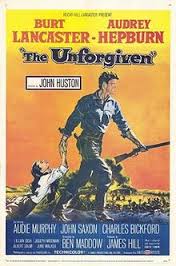
THE UNFORGIVEN
US, 1959, 115 minutes, Colour.
Burt Lancaster, Audrey Hepburn, Audie Murphy, Lilian Gish, Charles Bickford, Joseph Wiseman, John Saxon.
Directed by John Huston.
The Unforgiven is an interesting western from veteran director John Huston. A film for comparison would be Don Seigel's Flaming Star with Elvis Presley, made at the same time with a similar theme - the Indian in white society in the west. This film certainly raises its issues interestingly but may solve them in a somewhat facile manner.
Audrey Hepburn acts well in the central role and there are interesting performances from Lilian Gish and Joseph Wiseman.
1. Was this a good western?
2. Why were the Indians pictured prior to the credits?
3. Who was 'the unforgiven' and why?
4. How strong a character was Rachel? How was her character built up from the start, visually? Was Audrey Hepburn credible in the role?
5. Was the introduction of Kelsey and his mysterious words and manner effective? How did it affect the film and create suspense?
6. What kind of family were the Zacharys? Why the hatred of the Kiowa? Were the whites justified in their hostility to the Indians?
7. Comment, on the way the film built up our knowledge of, and reaction to, each of the principal characters - mother, Ben, Cash, Andy, the Rawlins, Charlie, Giorgio
8. Did the film present a convincing picture of this west - cattle work, trips to Wichita, courting etc?
9. How effective was the close-up sequence of Kelsey revealing the truth about Rachel? Why? How cruel were the families? Why did Mrs. Zachary hang Kelsey? Did she have the right to do this, even to protect Rachel?
10. How was the atmosphere of siege and isolation built up? Why did the Indians attack? Did Mrs Zachary deserve her death from the Indians?
11. Why did Rachel make her choice? Comment on the impact of the death of the Indians and Rachel firing at point blank range. Were they resigned to die?
12. Was the return of Cash too easy or was it effective in the framework of the film?
13. Did the film have anything significant to say on the west, Indians and white men? Who were guilty? How was Rachel the victim of both worlds?
14. How surprising was Charlie's death, the appearance of the three Indians, Kelsey's part in it? The families' clash after Charlie's death and the chase after Kelsey? Did the posse have the right to go after Kelsey, execute jostiffe?
15. The paint on Rachael's face as a symbol of the truth?
Published in Movie Reviews
Published in
Movie Reviews
Tagged under
Saturday, 18 September 2021 18:47
Ulzana's Raid
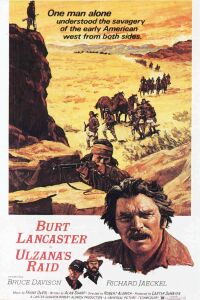
ULZANA'S RAID
US, 1973, 100 minutes, Colour.
Burt Lancaster, Bruce Davison.
Directed By Robert Aldrich.
Ulzana's Raid is a Robert Aldrich film. Well respected as a very competent movie maker who puts entertainment above all, his films are usually interesting for the message discerner as well. This western seems to be one of his best efforts, shorter, tighter, more direct than some of his blockbusters of the late sixties - his range is wide: Whatever Happened to Baby Jane, Hush, Hush Sweet Charlotte, Flight of the Phoenix, The Dirty Dozen, The Killing of Sister George, Too Late the Hero.
Usually his films have a tough, even too violent streak, and the same caution is applicable here. The film explores the savagery of both white man and red man, and the impossible situations that men are put into because of this heritage of savagery. Some have criticised the film for being only an average savage western - others have said it is pretentious in its portrayal of its messages.
Burt Lancaster gives one of his subdued performances. Bruce Davison looks, perhaps, too boyish for his role.
1. Was this a good western and did it have more to offer than usual? Why?
2. First impressions of the men at the Fort, and the responsibility of the Army for marauding Indians?
3. Why did Ulzana go on his raid? Why did life at the Agency force Indians to go out raiding? How were white attitudes of authority illustrated in the film? the Apache mentality as presented by the screenplay?
4. Were the Apache marauders presented in any way as sympathetic? Why?
5. What kind of man was Mclntosh? Why did he not hate the Apaches yet still fear them? Did he understand them? Was he a worthy opponent for them?
6. How important for the film was the contrast between Mclntosh and De Buin? Was it significant that De Buin was a minister's son?
7. How 'psychological' was the film in its presentation of the chase, each group anticipating the other?
8. How clever was the final strategy - how sad and wasteful of men; the impact of all the deaths, and that of the sergeant?
9. What significance had the death of Mclntosh? Why did he choose to die?
10. What effect did Vienna's death have on De Buin?
11. What did the film offer on Indians, racism, human nature? Was it optimistic or pessimistic?
12. Thematic sequences - the conversations about power and an Apache's killing a man to gain his power: 'the Apaches are like the desert, they are there'; the talk about man's equality in good and bad (including white and red torturers) and Christ and Christians?
13. Technical aspects: the convention of the chase structure; the Fort - basketball, the rider and De Buin's eyes, the emptiness of Arizona; the massacres: mother shot by the officer who killed himself, terrorising of the farmer, the raped woman, Apache brutality on the dead officer, the death of Ulzana's son and the soldier's savaging the corpse; the discussions of torture?
Published in Movie Reviews
Published in
Movie Reviews
Tagged under
Saturday, 18 September 2021 18:47
Up in Arms
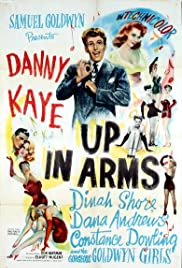
UP IN ARMS
US, 1944, 106 minutes, Colour.
Danny Kaye, Dinah Shore, Dana Andrews, Constance Dowling, Louis Calhern, Margaret Dumont, Virginia Mayo.
Directed by Elliot Nugent.
Danny Kaye's first film. Popular on the New York stage, on radio and in night clubs, he impressed people with his zany style and the speed of his routines. Samuel Goldwyn introduced him to the screen and presented the films of the first years of his career. This is a typical Army comedy enhanced by his presence and that of Dinah Shore who was so durable over so many decades in films, radio and especially television.
Dana Andrews in an unusual choice for the straight man to Danny Kaye's comedy. Virginia Mayo can be seen as the head of the Goldwyn Girls - she was to he his leading lady in his next four films. There are some very funny routines although they seem a bit basic now but the origins of Kaye's more mature routines can be seen. The song in the theatre foyer is a highlight. Many of his songs in this film are written by Sylvia Fine who was to be his wife and the writer of so much of his material throughout his career. Dated war comedy, but of great interest for the history of American comedy.
1. The film as an introduction to Danny Kaye, the way that he was presented in terms of comic routines, his speedy delivery, song and dance? Kaye's reputation prior to the film, throughout his film and television career? The particular characteristics of his style - the persona of the eccentric and weak young man who somehow or other achieves heroism?
2. The impact of this war comedy during the war? As the first Danny Kaye's comedies? The war impact now?
3. The contribution of the film to the war effort? The irony of the nervous wreck (the title of the original play) and his unwittingly becoming a hero? The potential for all Americans to heroism, the American dream?
4. The presentation of the American dream of heroism for the hypochondriac? The fulfilment of romance? Acceptance by friends and too The lush nature of the literal dreams - and the rather gaudy style?
5. The production values: colour, the hospital locations, the ship, the Pacific island, the fantasy especially for the musical sequences, the Goldwyn Girls?
6. Danny Weems as the hero of the film? The army men talking about his hypochondria and then our seeing it illustrated in the elevator? The infatuation with Mary and his blindness to Virginia? The humour of the outing and what it revealed about his character in terms of relationship to Joe, Mary, Virginia, Mrs Willoughby? His being drafted and the humour of his unwillingness to open the letter? The effect of the training on him - and the loss of so many pills, the men's reaction and their hardness towards him? The fights in camp? The making of the record? Life on the ship especially after Mary's unintentional stowing away? The effect of hiding, the chases around the ship and authorities' attitude towards him? His being in the brig and its leading to the heroism of such a great capture? Fantasy land and the dreams of the American male? Especially with the Goldwyn Girls an background to his heroism?
7. The contrast with Joe an the straight man, going out with Mary and Virginia, the background and chorus, Jowls benign attitudes especially trying to help him get out of the draft? Jowls helping him on the ship? The other soldiers and the contrast with Danny? especially the burly antagonistic men? Ashley an the authority figure being confronted by Danny? The irony of their appearance in his dreams? the dancing confreres, Ashley performing the wedding ceremony with Danny Kaye's speedy delivery?
8. Mary and Virginia an heroines, nurses, in the Army? Sweet, comic? How well delineated were their characters? Romance? Mary's niceness, Virginia's heroism in taking the blame? The background of the Goldwyn Girls as nurses and in the Army? how realistic?
9. Comment on the comedy routines and their style: the elevator sequence and making the man ill, the irony of rehearsing his proposal with Virginia, the milk sequence in the restaurant, the theatre foyer song, Joe and the opening of the letter, the lights in camp, their making of the record? and the later miming of it, the song and dance routines, the chase throughout the ship, hiding in Ashley's room, the inspection and his impersonating the Irishman (and the effectiveness of Danny Kaye's impersonations), the routine of tricking the Japanese and capturing them all?
10. The importance of the songs - the romantic songs with Dinah Shore? Danny Kaye's comic variations and the comic songs and especially the patter and routines between the two of them at the end? The patriotic song with people boarding the ship and its later use?
11. How well did the film combine all the elements of the screwball comedy with American dream fantasy and forties' style musical and comedy?
12. The light touch on male/female relationships, romance, love? The humour on hypochondriacs and heroes?
Published in Movie Reviews
Published in
Movie Reviews
Tagged under
Saturday, 18 September 2021 18:47
Undefeated, The
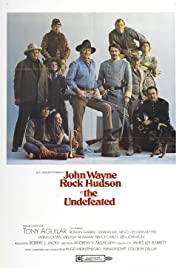
THE UNDEFEATED
US, 1969, 119 minutes, Colour.
John Wayne, Rock Hudson, Jan Michael Vincent, Ben Johnson.
Directed by Andrew V.Mc Laglan.
A standard spectacular western starring John Wayne and Rock Hudson.
It is a typical John Wayne vehicle, heroism and toughness and good fellowship in the American west. He is quite well-matched by Rock Hudson as the leader of a Southern group going to Mexico after the end of the Civil War. Jan Michael Vincent has an early role and a lot of John Ford regulars are in the supporting cast, including Ben Johnson.
The film is directed by Andrew V. Mc Laglen who directed a number of John Wayne films and westerns with James Stewart for example, McLintock?, Shenandoah, Chisholm. He has directed many action films including the ambitious The Wild Geese. Attractive colour photography by William Clothier and a rousing if derivative score by Hugo Montenegro.
1. The appeal of the western, the background of the Civil War, the clash of North and South, the American heritage of the west, heroism? Cattle, treks, western landscapes and the Rio Grande? Mexico? How colourful and enjoyable was this western?
2. The film as a John Wayne vehicle and his standard performance, values? A symbol of the American west? How well-matched by Rock Hudson representing the South? The working together as a team, the clash of characters? A dramatic western?
3. Colour photography, Panavision, Texan and Mexican locations? The cattle and horse round-up, the trek, the battles? The rousing western style score?
4. The basic western plot - the retired military from the North, having to settle down, rounding up horses, the agreements with the Mexicans, the clash with the Southerners, with the Juaristas? The betrayal and the final battle? The Southern rebel family trying to join with the emperor Maximillian? The atmosphere of the west?
5. John Wayne as hero? Colonel Thomas? His leadership, work in the Civil War, the final battle of the war and the deaths? The attempts to make peace and yet the underlying hostility? His encountering this hostility with Colonel Langdon and his family? The good fellowship and the men of the west, partners, working together? The rounding up of the horses? Taking them to Mexico? The encounter with Langdon, clashes? The celebration of the Fourth of July party and the good fellowship and brawling? Keeping a wise eye on the group? The Mexican situation, the going to the rescue of the Langdon family? Returning to America? A typical John Wayne hero?
6. Rock Hudson's style as Colonel Langdon - the house in the South, the unwillingness to acknowledge the end of the war, the burning of the mansion? The group and the hopes for Mexico? The clash with the bandits and needing to be rescued by Thomas? Mutual suspicions? The good fellowship on the celebration? The build-up of the romance between Blue Boy and Charlotte? Bubba and his courting of Charlotte? The way that the romance was used for the finale and the need for rescue? The happy ending? Rock Hudson's style as a Southern gentleman?
7. The minor characters - Thomas's friends, their advice, participation in the round-up, the clash with the bandits, the Mexican situation and the Juaristas? Audience response to the types of the west? The contrast with Langdon's family, his wife and her Southern attitudes. his daughter, Bubba, the suspicions of the Southerners for the Northerners?
8. The Mexicans - the bandits and their cruelty and the siege, the Juaristas and their taking over from Maximillian's troops, General Rojas and his conditions? The kidnapping of Charlotte, Langdon's plea and the final clash?
9. The set pieces of the western - the many sequences of trekking through the desert, the intercutting of the journey of the Northerners and the Southerners? The spectacle of the rounding up of the horses, stampeding? The battle with the French troops? The final siege? Special effects for a satisfying western?
10. How well did the film use the basic western themes, present the American heritage of the 19th century? The ever-popularity of the western?
Published in Movie Reviews
Published in
Movie Reviews
Tagged under